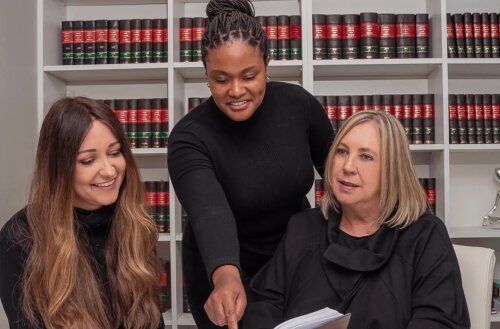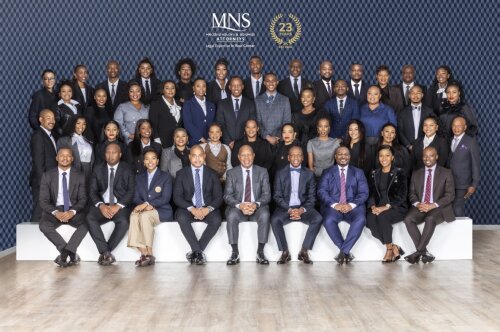Best General Litigation Lawyers in South Africa
Share your needs with us, get contacted by law firms.
Free. Takes 2 min.
Or refine your search by selecting a city:
List of the best lawyers in South Africa
South Africa General Litigation Legal Articles
Browse our 2 legal articles about General Litigation in South Africa written by expert lawyers.
- South Africa Estate Planning and Inheritance for Foreigners
- South Africa practices "Freedom of Testation," allowing you to distribute your assets to anyone you choose, regardless of the "forced heirship" laws in your home country. A separate South African will is the most efficient way to manage local immovable property and prevents administrative delays at the Master of the... Read more →
- Suing for Medical Malpractice in South Africa - Legal Guide
- Medical malpractice claims in South Africa fall under the law of delict, requiring proof of negligence, causation, and actual damages. The standard prescription period for filing a claim is generally three years from the date the patient became aware of the negligence. Expert medical testimony is mandatory to establish whether... Read more →
About Litigation Law in South Africa
Litigation in South Africa refers to the legal process of resolving disputes or claims in a court of law. It involves the presentation of cases before a judge in either a civil or criminal court. Civil litigation primarily involves resolving disputes between individuals or entities over rights and obligations, while criminal litigation involves prosecuting crimes against the state. The South African legal system is based on Roman-Dutch law, English common law, and indigenous law, which creates a unique legal framework.
Why You May Need a Lawyer
Engaging a lawyer for litigation can be crucial in various situations. Some common scenarios include:
- Involvement in a civil dispute such as breach of contract, property disputes, or family law matters.
- Being a defendant or plaintiff in a lawsuit.
- Facing criminal charges or needing to enforce legal rights through a court order.
- Negotiating settlements or understanding complex legal documents and procedures.
- Protecting intellectual property rights or pursuing actions for defamation or personal injury.
Local Laws Overview
Key aspects of local laws relevant to litigation in South Africa include:
- Constitutional Law: The South African Constitution is the supreme law of the land, ensuring that all other laws comply with its principles.
- Civil Procedure: Governed by the Uniform Rules of Court, which specify the processes and standards for civil litigation in High Courts.
- Criminal Procedure: Crimes are prosecuted in Magistrates' Courts or High Courts according to the Criminal Procedure Act.
- Evidence and Legal Precedents: Litigation heavily relies on the presentation and assessment of evidence and adherence to precedents established in prior court judgements.
- Laws of Contract and Tort: These laws govern disputes between parties involving contracts or wrongful acts causing harm.
Frequently Asked Questions
What is the first step in initiating litigation?
The first step typically involves consulting with a lawyer to determine the merits of your case and drafting a letter of demand if applicable, followed by filing the necessary legal documents in court.
How long does litigation usually take in South Africa?
The duration varies depending on the complexity of the case, court schedules, and whether the case is settled or proceeds to trial. Simple cases may be resolved in a few months, while complex ones can take years.
What is the cost of hiring a litigation lawyer?
Legal fees in litigation depend on the lawyer's experience, the complexity of the case, and the amount of time required. Costs can significantly vary, so it's advisable to discuss fees and payment structures upfront.
Can I represent myself in court?
While self-representation is allowed, it is generally not recommended due to the complexities involved in legal procedures and the expertise required in presenting a case effectively.
What are court-annexed mediations?
This is an alternative dispute resolution process facilitated by courts to help parties resolve disputes without going to trial, saving time and reducing litigation costs.
What should I bring to my first meeting with a lawyer?
You should bring any relevant documents, such as contracts, correspondence, or evidence pertaining to your case, and be prepared to discuss the details thoroughly.
What is discovery in litigation?
Discovery is a pre-trial phase where both parties exchange relevant information and documents related to the case to ensure transparency and prepare for trial.
How can a case be resolved without going to trial?
Cases can be settled through negotiations, mediation, or arbitration, where parties agree to resolve disputes without a formal court decision.
What is a legal precedent?
Legal precedent refers to a principle or rule established in a previous legal case that is binding or persuasive for a court deciding subsequent cases with similar issues.
What happens if I win the case?
If you win, the court may award damages or enforce an order in your favor. Execution of the judgment may involve further legal procedures to ensure compliance.
Additional Resources
Here are a few resources and organizations that can be useful:
- Legal Aid South Africa: Provides legal assistance to those who cannot afford representation.
- The Law Society of South Africa: Offers information on finding reputable lawyers.
- South African Courts: Official portals provide details on court processes and locations.
- Department of Justice and Constitutional Development: Offers access to legal information and resources.
Next Steps
If you need legal assistance in litigation, follow these steps:
- Identify the type of legal issue you are facing and gather all relevant documents.
- Research and shortlist potential lawyers or law firms specializing in your area of need.
- Schedule consultations to discuss your case and understand the legal options available.
- Consider the lawyer's advice, fees, experience, and strategy before selecting whom to hire.
- Proceed with your chosen legal representative and ensure open communication throughout the process.
Lawzana helps you find the best lawyers and law firms in South Africa through a curated and pre-screened list of qualified legal professionals. Our platform offers rankings and detailed profiles of attorneys and law firms, allowing you to compare based on practice areas, including General Litigation, experience, and client feedback.
Each profile includes a description of the firm's areas of practice, client reviews, team members and partners, year of establishment, spoken languages, office locations, contact information, social media presence, and any published articles or resources. Most firms on our platform speak English and are experienced in both local and international legal matters.
Get a quote from top-rated law firms in South Africa — quickly, securely, and without unnecessary hassle.
Disclaimer:
The information provided on this page is for general informational purposes only and does not constitute legal advice. While we strive to ensure the accuracy and relevance of the content, legal information may change over time, and interpretations of the law can vary. You should always consult with a qualified legal professional for advice specific to your situation.
We disclaim all liability for actions taken or not taken based on the content of this page. If you believe any information is incorrect or outdated, please contact us, and we will review and update it where appropriate.
Browse general litigation law firms by city in South Africa
Refine your search by selecting a city.
















